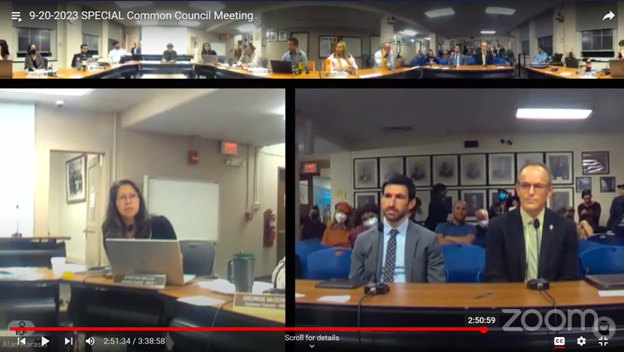
Here are excerpts in the exchange I had with Joel Malina, Cornell’s VP of University Relations at last night’s Special Council Meeting on the MOU – Sept 20, 2023. edited for clarity [takeaway – A 20-year term tied to inflation at $4 million is not that deal ]
Full video here: https://www.youtube.com/watch?v=6V2ewws0joI
Joel Malina:
… This is one component of over $30 million that Cornell spends every year, financial expenditures that directly benefit the city and its residents. So it’s this $4 million, which we’re proposing as is in the agreement before you. It is $5.8 million that covers our commitments to critical services like TCAT. Our contribution to the amazing community housing development funds, or contribution to area economic development or contributions to numerous nonprofits. Then you add on to it the $650,000 a year to the city school. And then you add on the over $19 million that we spend on what we call municipal-like services public safety, sewer, paving, snow removal. These are expenses that Cornell pays that the city might otherwise be responsible for. So you add this up yes, $4 million when you look at $30 million is a very small component. But the $30 plus million dollars that we do spend to benefit the city, I think is a number that should resonate for the people of the city. And the increase from $1.6 to $4 million, I think says a lot about our desire to be a partner to be committed to the future of the city.
Cynthia Brock, at 2:50.52 of the video through 2:56.25.
Thank you both for being here. I wish you had come at 6:00. You would have a sense of what the conditions are, that we work within. The people who we are accountable to. The people who rely on the group here to protect their interests. And if you had come earlier and had a sense of where we are, I think you would understand why people on this side of the table are speaking so passionately on this issue. The most difficult thing about this for me is that the original deal, which I think was 1985? 1995 was a terrible deal. (Joel: I was not here) and we’ve replicated the deal: a 20-year term tied to inflation of at what at the time was a reasonable amount. But by design, the value of that contribution declines almost immediately because, as you know, we are a service institution. Our labor costs — they’re not tied to inflation. They rise much faster than inflation. Our environment, even between ‘95 and now… in 1995, I’m going to just guess off the top of my head — the average American was spending 30% of their income on their living expenses. The average American now is paying over 50% of their income on living expenses. Their health care costs have gone up dramatically. They can’t make ends meet. Right? Let’s add to the situation that New York State’s contribution to local municipalities has remained flat for 20, 30 years. New York State is intentionally starving municipalities of resources. The conditions of the original agreement was terrible when it was laid out in 1995. It is exponentially more terrible now. And so I understand when (Cornell says) it’s more convenient. It’s very comfortable to replicate those conditions in terms of predictability on behalf of Cornell, but it is just untenable in the situation that we’re facing now. And when we have to look at our residents who are being priced out of their home, who really are facing the reality that they are going to lose their home… We can’t. We need to think differently. We need Cornell to be a part of this process with us and recognize that life is changing rapidly. And a 20-year term is too long. I would hope that we would all believe that if you build it into your budget, it’s not going to go down. Even if something like COVID happens. You recognize the obligation, the partnership that you have with this community. And (Cornell) would continue at least in the very beginning or at the very level to say we’re not going to pay any less than we did last year. But let’s sit down and think again, about what our community needs. How can we help.
I recognize and appreciate that Cornell pays for a lot of services that would otherwise be brought by a municipality. And you have luxuries that go along with that. You get snow removal much faster than the average Ithacan. You get to have big wide sidewalks and huge tree lawns, and trees and landscaping that we as a municipality can’t afford to provide for our residents. And so yes, you could add some very large dollar amounts to the high-end premium services that you provide for yourself that the City doesn’t have to provide, but recognize that the average Ithacan doesn’t come up to the hill and doesn’t get to partake in that and so I don’t really think it’s fair to say that that is a community contribution that you’re making to Ithacans. So I urge you in good faith, as a partner to the people who work at Cornell, who take care of your children, who take care of your family members, who provide groceries and food and everybody else who’s struggling to make ends meet. To continue this commitment for the 2023 budget, the 2024 budget, to continue to negotiate with our team to come up with something that allows us to look in the eyes of our workers and our constituents and say “Yes, Cornell and Ithaca are partnering together to support each other, and we’re going to try to find a reasonable, rational deal that will help us into the future.” But a 20-year term tied to inflation at $4 million is not that deal.
Second clip of Cynthia at 3:23.32 of the video.
Full video here: https://www.youtube.com/watch?v=6V2ewws0joI


